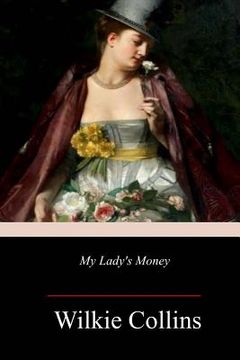Reseña del libro "My Lady's Money (en Inglés)"
William Holman Hunt OM (2 April 1827 - 7 September 1910) was an English painter and one of the founders of the Pre-Raphaelite Brotherhood. His paintings were notable for their great attention to detail, vivid color, and elaborate symbolism. These features were influenced by the writings of John Ruskin and Thomas Carlyle, according to whom the world itself should be read as a system of visual signs. For Hunt it was the duty of the artist to reveal the correspondence between sign and fact. Of all the members of the Pre-Raphaelite Brotherhood, Hunt remained most true to their ideals throughout his career. He was always keen to maximize the popular appeal and public visibility of his works.EARLY LIFECollins was born at 11 New Cavendish Street, Marylebone, London, the son of a well-known Royal Academician landscape painter, William Collins and his wife, Harriet Geddes. Named after his father, he swiftly became known by his middle name, which honoured his godfather, David Wilkie. The family moved to Pond Street, Hampstead, in 1826. In 1828 Collins's brother Charles Allston Collins was born. Between 1829 and 1830, the Collins family moved twice, first to Hampstead Square and then to Porchester Terrace, Bayswater. Wilkie and Charles received their early education from their mother at home. The Collins family were deeply religious, and Collins's mother enforced strict church attendance on her sons, which Wilkie disliked.In 1835, Collins began attending school at the Maida Vale academy. From 1836 to 1838, he lived with his parents in Italy and France, which made a great impression on him. He learned Italian while the family was in Italy and began learning French, in which he would eventually become fluent.From 1838 to 1840, he attended the Reverend Cole's private boarding school in Highbury, where he was bullied by a boy who would force Collins to tell him a story before allowing him to go to sleep. "It was this brute who first awakened in me, his poor little victim, a power of which but for him I might never have been aware.... When I left school I continued story telling for my own pleasure," Collins later said.In 1840 the family moved to 85 Oxford Terrace, Bayswater. In late 1840, he left school and was apprenticed as a clerk to the firm of tea merchants Antrobus & Co, owned by a friend of Wilkie's father. He disliked his clerical work but remained employed by the company for more than five years. Collins's first story The Last Stage Coachman, was published in the Illuminated Magazine in August 1843. In 1844 he travelled to Paris with Charles Ward. That same year he wrote his first novel, Iolani, or Tahiti as It Was; a Romance, which was submitted to Chapman and Hall but rejected in 1845. The novel remained unpublished during his lifetime. Collins said of it: "My youthful imagination ran riot among the noble savages, in scenes which caused the respectable British publisher to declare that it was impossible to put his name on the title page of such a novel." It was during the writing of this novel that Collins's father first learned that his assumptions that Wilkie would follow him in becoming a painter were mistaken.William Collins had intended Wilkie for a clergyman and was disappointed in his son's lack of interest. In 1846 he instead entered Lincoln's Inn to study law, on the initiative of his father, who wanted him to have a steady income. Wilkie showed only a slight interest in law and spent most of his time with friends and on working on a second novel, Antonina, or the Fall of Rome.After his father's death in 1847, Collins produced his first published book, Memoirs of the Life of William Collins, Esq., R. A., published in 1848. The family moved to 38 Blandford Square soon afterwards, where they used their drawing room for amateur theatricals. In 1849, Collins exhibited a painting, "The Smugglers' Retreat," at the Royal Academy summer exhibition. Antonina was published by Richard Bentley in February 1850.
(Londres 1824-1889) Dramaturgo, novelista y prolífico autor de relatos. A los 17 años comienza a trabajar en una empresa de comercio de té mientras escribe Ioláni, o Tahití tal como era (Gótica nº 32), obra que no vio la luz hasta más de un siglo después de su muerte. Estudió Derecho y, aunque nunca llegó a ejercer, sí utilizó los conocimientos jurídicos en muchas de sus obras, y la crítica le considera uno de los padres del género policiaco. En 1851, conoce a Charles Dickens, al que le unirá una profunda amistad y publicará en su semanario All the Year Around sus principales obras. Tras la muerte de Dickens en 1870, su popularidad decae. Padeció de gota reumática la que le acabó provocando una adicción al opio. El epitafio de su tumba le destaca como el autor de la novela La dama de blanco.
Ver más
Ver menos

